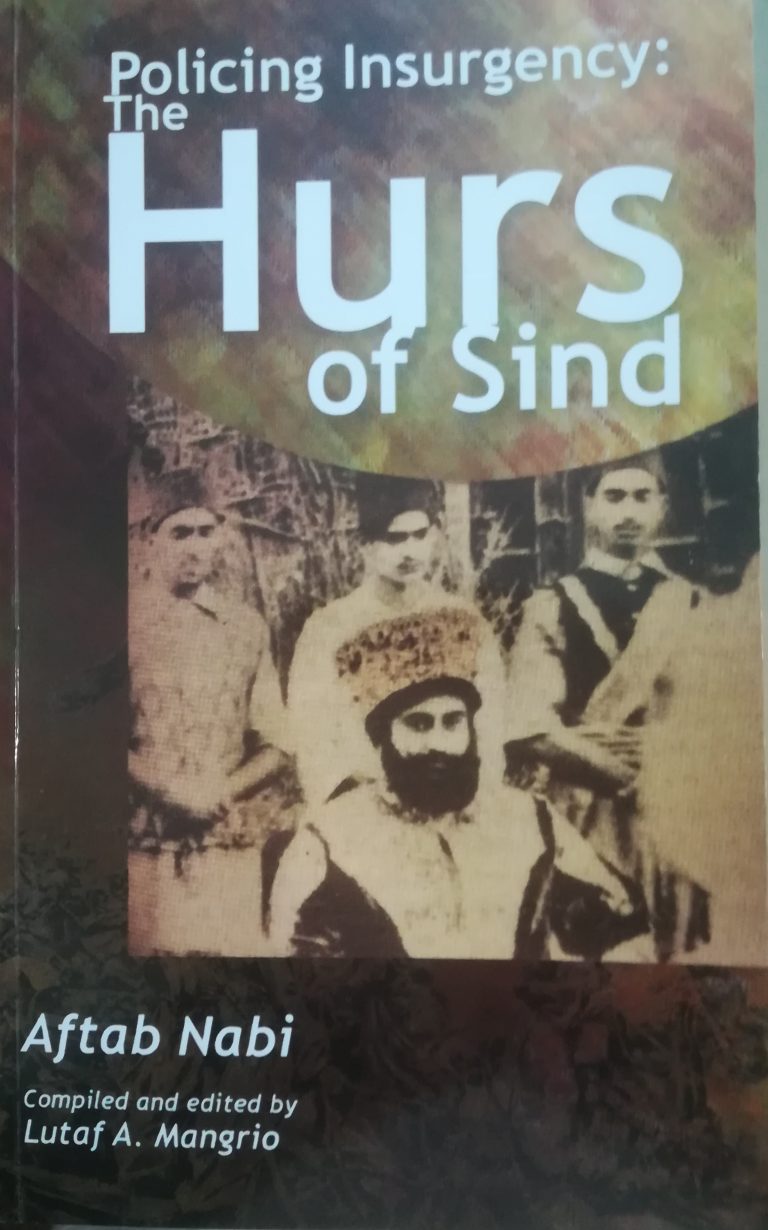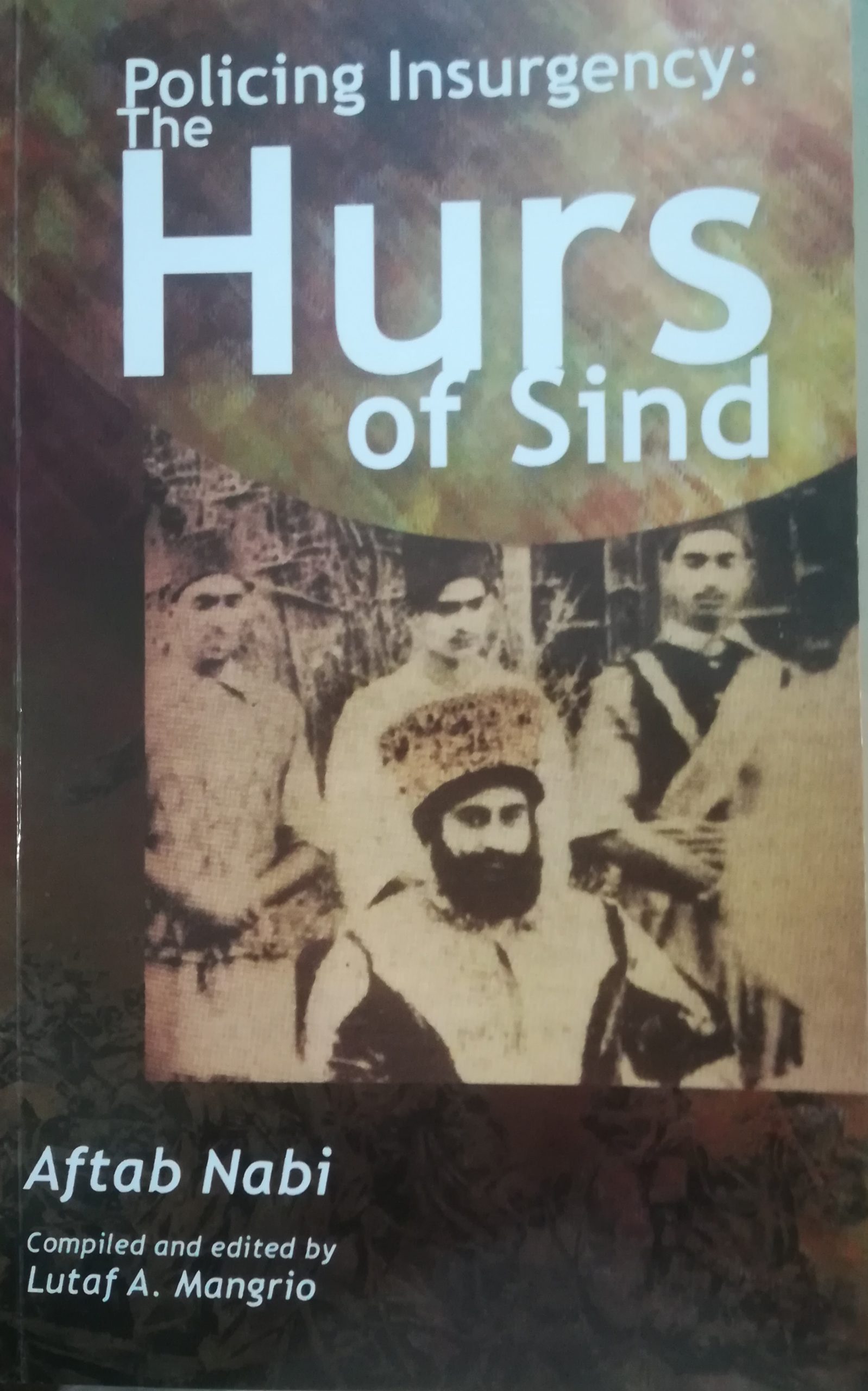
 Aftab Nabi, former Inspector General of Sindh Police, in his book ‘Policing Insurgency: The Hurs of Sindh’ writes on colonial repressive techniques applied against the sympathizers of Hur Movement during British Raj
Aftab Nabi, former Inspector General of Sindh Police, in his book ‘Policing Insurgency: The Hurs of Sindh’ writes on colonial repressive techniques applied against the sympathizers of Hur Movement during British Raj
The book, the collection of eleven research papers, examines the policing and administrative strategies of the colonial government of Sindh in response to the Hur Movement’s two phases – one of 1890s and the other of 1940s. “An effort has been made to assess the concept of British justice, as meted out to Pir Sibghatullah Shah, the Pir Pagaro, in the context of a situation when the government was under pressure, both from internal and from external forces during the Second World War,” writes the author of the book published by Soreh Badshah Study Circle.
Dedicated to all courageous women and the children of the Hur Movement who suffered and survived the colonial brutality, the book uncovers many incidents of brutality buried so far in the archival record of British era or are mentioned in certain books written by British officers of that time, hardly available here.
The subject matter has been dealt in three segments in the book. First parts deals with the policing of the Hur insurgency; the second covers the Martial Law, and the third section is summary of events and developments from 1944 to 1954.
Aftab Nabi writes about Edward Cox (Later, Sir Edmund Cox), who became first Deputy Inspector General of Police in Sindh after 1900, and wrote six books, fiction and non-fiction, some pertaining to policing of Sindh and the Bombay Presidency. “Edward Cox toured villages in the Hur areas to put ‘the fear of God’ and of British Raj into the sympathizers of the movement. A very large number of arrests were made and punitive police was located on the villages, the cost being met by the villagers,” he shares.
Quoting another incident of brutality, Aftab Nabi writes, “In Hyderabad district, at one stage the residents had been fined 250000 rupees, a blatantly enormous amount at that time. In addition, a landlord had to pay an amount equal to the assessment on land revenue paid by him.”
Three infantry companies and a squadron of cavalry were inducted but their presence did not restore law and order.
About other actions taken by the colonial authorities, the book quotes Edward Cox:
‘intimidating action was taken against the leading Hurs, lists were compiled of active and known sympathizers, gun licenses and exemptions from the Arms Act were revoked and lands were attached. Even the announcements were made that canal water would be withheld till the trouble was over.’
The book reveals that Edward Cox has confessed that a ‘great deal more was done in subduing these malefactors than was ever placed on record’, and also that ‘it was no use to be squeamish about methods in running them to earth.’
The book also contains the account how the Baloch Regiment and the Bugtis were used to crush the uprising and killing of Piru Wazir and other Hurs in Makhi area and how several Hurs were hanged in Tharparkar.
The Soreh Badshah Study Circle (SBSC) published this book in 2020, as part of its efforts to decolonize the history by bringing forth the research work on Hur Movement. The SBSC had earlier published compilation of research-based article of Aftab Nabi in book form. Those articles were published in English daily Dawn in 1990s.
Aftab Nabi, who did M.A. in economics from Karachi University in 1967, L. L. B in 1982 from Sindh University, M.Sc. in Defence and Strategic Studies from Quaid-e-Azam University (via National Defence College) Islamabad in 1994 and M. Phil in Criminology from the University of Cambridge U.K in 1995-96, is currently registered for Ph.D. at the University of London. His thesis will be on the ‘Criminological Consequences Due to the Application of the 1871 Criminal Tribes Act on the Hurs of Sindh – 1900 to 1952.’
___________________
Sindh Courier